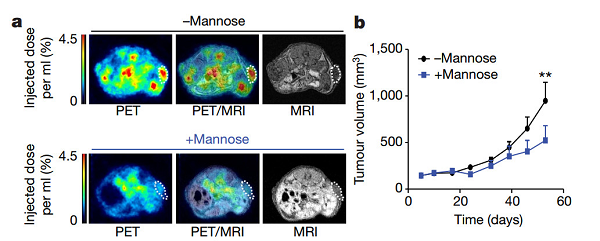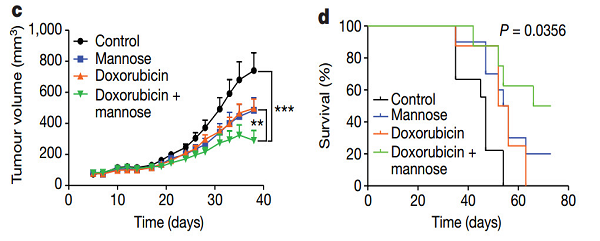We know that in order to grow, cancer cells need to consume a lot of glucose. If glucose is not available, the growth of cancer cells will naturally be inhibited. All this makes sense.
But we also know that cell test results are not necessarily of clinical value. Mannose inhibits the growth of cancer cells in vitro, which is great. But can it also inhibit cancer in animals?
▲Intake of mannose reduced the size of tumors in mice (Image Source: Reference [1])
To answer this question, scientists took mannose orally to mice with tumors. Serum analysis showed that the concentration of mannose in these mice was about 3 mM. The scientists then injected the mice with isotope-labeled glucose to see if the sugars could be absorbed. As expected, glucose metabolism was also significantly inhibited in mice, suggesting that the results of cell experiments are expected to be repeated in mice.
Next, the researchers did an exciting experiment! They added mannose to the diet of the mice and injected the tumor cells subcutaneously into the mice to observe the growth of the tumors. Studies have shown that mannose intake does not affect the weight of mice, nor does it affect the health of mice, but can significantly inhibit the growth of tumors! These findings confirm that mannose does have an anti-cancer effect in animals.
▲Mannose also improves the effectiveness of chemotherapy (green line) (photo source: reference [1])
More interestingly, the combination of mannose and chemotherapy can provide better anti-cancer effect. Compared with mice only taking mannose, mice receiving combined treatment had significantly longer survival.
Researchers are optimistic about the effect of Mannose on cancer treatment. At the end of the paper, they pointed out that mannose is expected to become a new treatment for cancer metabolism. If it can be verified in human clinical trials, it will undoubtedly become a convenient and effective anti-cancer means!



